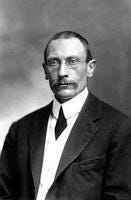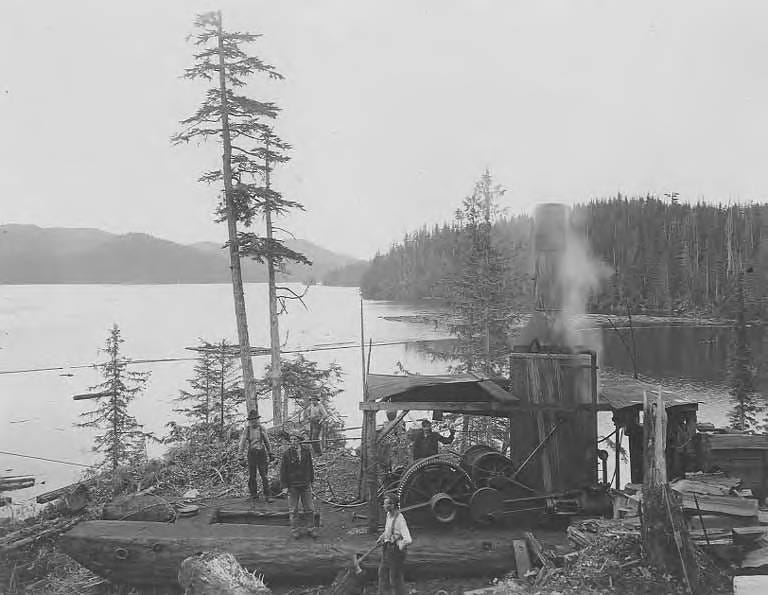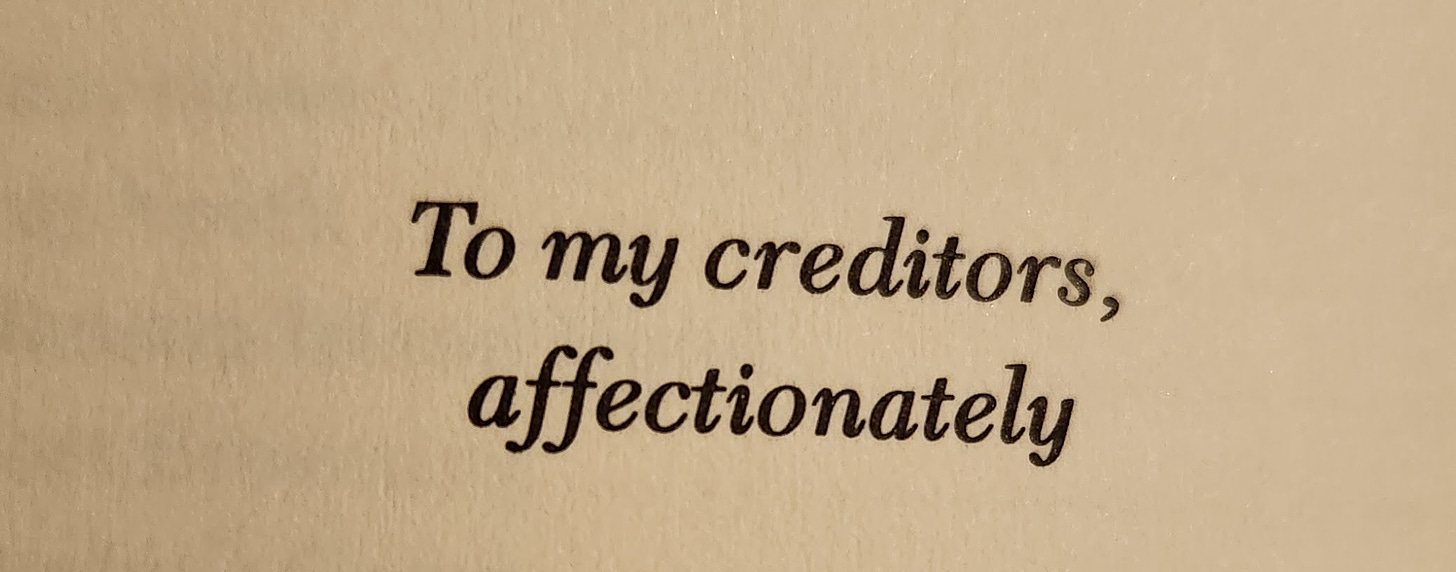The Former World of the Woods
How a Century-old Autobiographical Novel Reveals an Old System with All Its Tyrannies
The narrator in Martin Allerdale Grainger’s autobiographical novel pulls you in, using the “you” deliberately to invite you to walk along the streets of Vancouver, British Columbia. The narrator – a thinly disguised Grainger from more than a century ago – takes the reader from trendy shops on Cordova Avenue to the place where loggers outfitted themselves for work.
“You are among loggers,” he writes.
The world of these loggers in Woodsmen of the West (1908) is not in the city, but in the woods up the coast. The setting Grainger presents and the story he tells captures the brutality of logging as practiced on the West Coast more than a century ago. The book is not an explicitly reform tract (although Grainger eventually became a reformer). It is, instead, a detailed, realist account of the small-scale timber industry in BC forests. In small circles, it is considered a classic, the sort of book you see cited in histories of the region. And while I found the narrative sometimes dull, the book opens a useful window to the past.
Through that window, we can sense a former world, of woods and tyrannical bosses, of landscapes being wrecked and values being changed. Grainger captures much in Woodsmen of the West making it good fodder for considering extractive industries in decades past. Read on!
The Story
Woodsmen of the West follows the narrator up the coast from Vancouver to islands and inlets on the north side of Vancouver Island. He meets and works for Carter, a force of nature that Grainger calls a “despot” for his penchant for total control and uncaring manner. After a season or so working in logging camps and piloting a steamer from camps to supply points, the narrator gets fed up and quits…like all those before him. Through it all, storms of wind and drunkenness, and falling prices and breaking technologies punctuate the story. (This makes it sound a bit more dramatic than I found it.)

Some Themes
Grainger weaves some recurring themes in the book.
Debts. Everyone is in debt all the time. This drives much of the work. Markets plummet and make men desperate. Loggers go on benders and lose their money. Men with dreams need donkey engines and steamers and cash to pay workers. (Even the author suffered. The book’s dedication reads: “To my creditors, affectionately.”)
Drunkenness. Most people are drunk much of the time. Grainger includes many scenes in town where men are nearly universally drunk. The narrator generally eschews whiskey, but that makes him a rarity. Any arrival at a new place inevitably finds new characters unable to do their work.
Accidents & Technology. Not all accidents in Woodsmen of the West came from technology. Bad weather, for instance. However, donkey engines – the machine used in logging – and steamers routinely broke (and occasionally sunk). With money put into machinery, keeping them running was a critical investment, and the investment was meant to scale up operations and relieve owners of some burden of hiring men.1
If you spend any time reading the history of timber, you’ll recognize these themes are not fiction.
Other Themes
Excerpts of Grainger’s prose reveals other, often paradoxical values, too.
Character
Grainger’s narrator expresses contradictory messages about “character.” On the one hand, he clearly admired loggers and their strength:
Many of them might be commonplace in nature; but the average of character seemed high, as averages go; and there were some fine, virile-looking men, decided personalities amid the crowd. All the men were firm of flesh and weather-stained. And if whisky was their bane, better this, to my mind, than that dreary scheming to indulge in Comfort that meets one everywhere in city life.
But there were limits, as he noted later:
You see, the logger is not an introspective person. . . . Besides, if you are a logger yourself, a man occupied in struggles with Nature and natural objects, you do not cultivate the power of cross-examination.
Carter, the boss, contained even more contradictions. Within a couple pages, Grainger writes of Carter:
I like to be in contact with a great man.
And:
I liked his romantic battling with work, with nature, with the hostility of his fellow men.
Nature & Work
I hoped for some description of the coastal forests from the turn of the 20th century, but Woodsmen of the West is not nature writing.2 Still, stray verbs suggest that Grainger felt some qualms about the loggers’ operations. He referred to “butchering” the woods and efforts to “sack the woods.” (“The Sack of the Woods,” I’ll point out, is a key chapter from Bob Pyle’s Wintergreen that I wrote about here.)
When I entered graduate school to study environmental history, one of the new ideas at the time was looking at the intersection of labor and nature. A key insight was that people who primarily work in nature develop a distinct relationship from those who primarily play in nature.
According to Grainger, there was value in work in nature:
For it is good to be at healthy work with clean Nature around you.
Even further. It was beyond most men to
go out alone, or two or three together, against Nature in its wilderness; and there achieve noteworthy things by strain and stress of sweaty labour, hard endurance, laborious ingenuity.
The assumption here is that there are noteworthy things won by strain and sweat “at mercy of callous, disaster-dealing Nature.”

These themes stood out to me; you’d no doubt identify others.
A Note on the Author
The author was a creature of the British Commonwealth. Born in London in 1874, he relocated to Australia when his father became an official there. He bounced around as a young adult: Cambridge, the Yukon, the Boer War, England, and British Columbia again where he met a woman he wanted to marry. She returned to England, and he traveled there and persuaded her to not only marry him but return to BC.
The catch? He had no money. But with the advance he earned for Woodsmen of the West, he paid for their return – one source saying that she traveled in first class and he in steerage.3 Hence, the book’s dedication.
The book’s final lines suggest this life transition, as the narrator heads away from logging camps forever:
Farewell, then, to wrenching and tearing and intensity of effort; to great fatigues and physical discomforts; to sweaty work with simple tools; to trails in far-away mountain places; to rest and warmth beside log-fires in these woods!
Farewell to loggers and my youth!
Farewell to it all; marriage is better.
(I’ll note there is no exclamation point in that final line.)
Later, Grainger worked in government forestry, eventually as BC’s chief forester. After government service, he worked for in the lumber industry.
His disdain for bad practices and his romantic feelings toward logging found many themes in his novel. And career.
Final Words
I have a couple pieces of writing coming soon that I’ll alert you to. None of my previous work focuses specifically on the kind of logging described in Woodsmen of the West or British Columbia. However, my first and my last book provide plenty of context for this sort of environmental history.
Not to be too shameless but my book An Open Pit Visible from the Moon about a fight to keep mining out of wilderness is currently on sale, both the e-book and hardcover, for the lowest prices I’ve seen. I don’t know how long that will be the case. Get your copy!
As always, you can find my books and books where some of my work is included at my Bookshop affiliate page (where, if you order, I get a small benefit).
Taking Bearings Next Week
Next week is The Wild Card, and as has been the case of late, I don’t know what I’ll be doing. Stay tuned!
As we move in the direction of summer, I’m making a push to increase my subscribers and the engagement with these Taking Bearings newsletters. So if you want to help with that, please press the Like button below or leave a Comment. If you know others who might enjoy this weekly newsletter, please share it with them. And if you are able, consider upgrading to a paid subscription. Thank you for reading.
This point is fully developed in Richard A. Rajala, Clearcutting the Pacific Rain Forest: Production, Science, and Regulation (Vancouver: UBC Press, 1998), esp. 3-80.
The classic statement was Richard White, “‘Are You and Environmentalist or Do You Work for a Living?’: Work and Nature,” in Uncommon Ground: Toward Reinventing Nature, ed. William Cronon (New York: Norton, 1995): 171-85.
George Bowering, Bowering’s B.C.: A Swashbuckling History (Toronto: Penguin, 1996), 215.






One of your captions is “Swing Donkey...” but you probably meant “Steam Donkey...”, right?